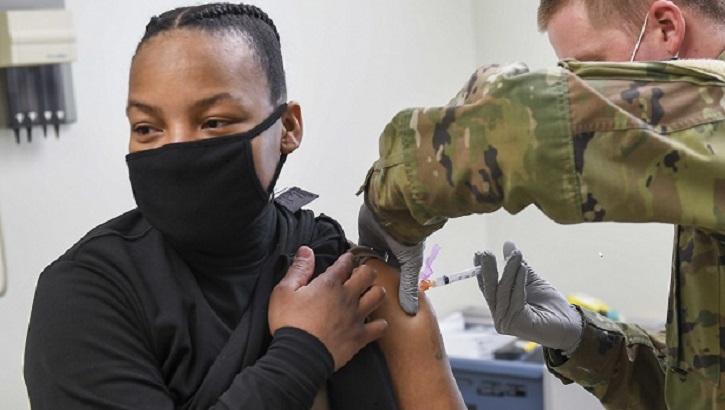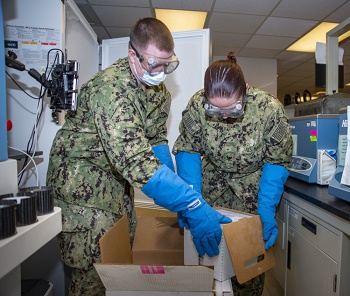Get the COVID-19 vaccine you can and get it now, Fauci and Place say
 Army Spc. William Hunter, right, administers the COVID-19 vaccine to Navy Chief Damage Controlman Solita Livingston at Navy Branch Health Clinic Chinhae, Republic of Korea, Jan. 8. Soldiers assigned to the 549th Medical Hospital Center, 65th Medical Brigade volunteered to administer the COVID-19 vaccine to sailors who were identified as frontline personnel by their commands (Photo by: Navy Mass Communications Specialist 2nd Class Michael Chen).
Army Spc. William Hunter, right, administers the COVID-19 vaccine to Navy Chief Damage Controlman Solita Livingston at Navy Branch Health Clinic Chinhae, Republic of Korea, Jan. 8. Soldiers assigned to the 549th Medical Hospital Center, 65th Medical Brigade volunteered to administer the COVID-19 vaccine to sailors who were identified as frontline personnel by their commands (Photo by: Navy Mass Communications Specialist 2nd Class Michael Chen).
Get a COVID-19 vaccine, and get it as soon as it's available to you.
That's the message from President Biden's Chief Medical Adviser Dr. Anthony Fauci and Defense Health Agency Director Army Lt. Gen (Dr.) Ron Place during recent town halls with military families addressing the safety, efficacy and availability of the vaccine.
"You're part of the solution to this outbreak," explained Fauci, emphasizing that the vaccine is needed to protect not only service members, but their families and acquaintances as well.
"You've got to think of your own health, which is really very important, but you've got to think about your societal obligation, including people close to you personally as well as other members of families of other individuals," he said.
"Because by getting infected, even though you may not know it, you may be inadvertently transmitting the infection to someone else, even though you have no symptoms," Fauci said.
Fauci and Place addressed thousands of military families during a second virtual town hall events hosted by Blue Star Families, a non-profit Military/Veteran Service Organization dedicated to military family matters, and the American Red Cross. The initial virtual town hall was held Feb. 4.
 Navy Hospital Corpsman 3rd Class Karsten Foster (left) and Navy Hospital Corpsman 3rd Class Hannah May unload a shipment of COVID-19 vaccinations into a freezer at Naval Medical Center Portsmouth in Virginia on Dec. 15 (Photo by: Navy Mass Communications Specialist 2nd Class Dylan M. Kinee).
Navy Hospital Corpsman 3rd Class Karsten Foster (left) and Navy Hospital Corpsman 3rd Class Hannah May unload a shipment of COVID-19 vaccinations into a freezer at Naval Medical Center Portsmouth in Virginia on Dec. 15 (Photo by: Navy Mass Communications Specialist 2nd Class Dylan M. Kinee).
Blue Star Families CEO Kathy Roth-Douquet thanked Fauci for his participation in both town halls addressing concerns and questions of military families. "After our last town hall, we found that 63% of [Blue Star Family survey] respondents who had been opposed or undecided before they listened to us reported that the event increased their likelihood of receiving the vaccine," she told Fauci. "That's a great result ... that's why we asked you to come back."
During the March 4 town hall, Place said the Department of Defense had administered almost 1.3 million total doses of the Pfizer and Moderna vaccines at 335 DOD sites around the world. As of March 11, this number has now increased to nearly 1.5 million vaccines administered. Additionally, more than 82,000 vaccinations have been administered to Military Health System beneficiaries at retail pharmacies, Place said.
He agreed that there is vaccine hesitancy among military service members but asked them to "observe and think it over. Speaking as a physician, the safety and effectiveness of the approved vaccines are exceptional," he said. "And every passing week the evidence only grows stronger … I'm certain that we will continue to see increased confidence with every passing week."
While supply is increasing and the DoD continues to limit vaccines to certain groups under Tier 1 of the distribution plan, Place said he expects that most DOD vaccination sites will move to Tier 2 by April. Tier 2 means the vaccines will be available to MHS families in the DOD.
"When your tier comes up, no matter where you are, in the United States, OCONUS (outside the continental United States), coming from OCONUS to the United States, when your tier comes up you get the vaccine," Place said.
Fauci emphasized that family members "are very important in encouraging vaccination" in military service members. "Young, strong healthy men and women's chances are very, very small in getting COVID-19, but we have examples. Some get only a moderate degree of symptoms, but they linger."
Asked whether holding off until a specific vaccine becomes available is a good strategy, Fauci advised: "Get the one you can get now." Janssen's one-shot vaccine recently received Food and Drug Administration emergency use authorization, so now there are three vaccines available to the public.
He also said to not wait to get vaccinated because of fear of the COVID-19 variants from South Africa, Brazil, and Great Britain. "Get vaccinated and get a high enough titer (a measure of antibodies in the blood). That will give enough of a cushion to protect against the variants."
To further allay hesitancy among service members to get vaccinated, he called the likelihood of serious adverse reactions to the vaccines "vanishingly small."
During a video message aired at the town hall, Secretary of Defense Lloyd J. Austin III stressed the "need to know the facts" but acknowledged it is sometimes hard to know whom to believe when it comes to COVID-19.
"We need to remember this is a personal decision" and "to think about your response to people around you" when deciding whether to get vaccinated. Nonetheless, "We need every voice in this fight to get out the word that the vaccines are safe," Austin said, calling the vaccination effort "paramount to our nation's security" and "a trust our military family has bestowed on us."